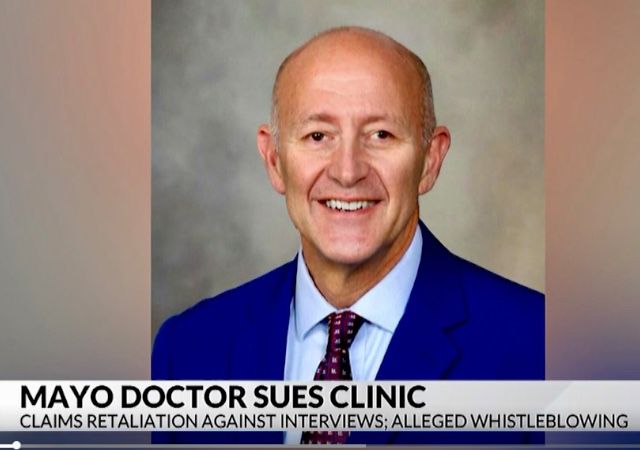Doctor Sues Mayo Clinic Claiming Retaliation For His Public Comments On Transgender Sports

A prominent doctor is suing the Mayo Clinic and two of its executives for threatening to fire him after he gave interviews to the New York Times about transgender sports and to CNN criticizing the National Institute of Health (NIH).
In his lawsuit filed November 13, Dr. Michael Joyner claims the clinic violated its own policies protecting academic freedom when it punished him for using “idiomatic language” that was “problematic” and “reflected poorly on Mayo Clinic’s brand and reputation.” Joyner is Professor of Anesthesiology and Vice Chair for Research at Mayo.
Joyner’s punishment allegedly included a one-week unpaid suspension, denial of any salary increase at his next annual review, and the threat of termination—all over comments he made based on his expertise in his area of scientific research.
The complaint points to two “problematic” media interviews, both allegedly pre-approved by Mayo, that led to his sanction for failure to comply with the Mayo Public Affairs Department’s preclearance and oversight of any media interviews.
You might not think you’d need an award-winning sports medicine expert to make the first set of remarks that got Joyner in hot water with Mayo. In a May 2022 interview with the New York Times featuring transgender swimmer Lia Thomas, he noted how, once puberty hits, boys swim faster than girls:
You see the divergence immediately as the testosterone surges into the boys, Dr. Joyner said. There are dramatic differences in performances.
The records for elite adult male swimmers are on average 10 percent to 12 percent faster than the records of elite female swimmers, an advantage that has held for decades.
…Testosterone is the 800-pound gorilla.
Those comments, Mayo later wrote in a March 2023 “Final Warning” letter published at FIRE, were “problematic” for the LGBTQI+ community at the clinic.
It was Joyner’s second set of comments, according to the complaint, that set the clinic’s disciplinary process against him in motion. In an interview with CNN about convalescent plasma treatment for Covid-19, he crossed a line when he criticized the NIH—a major source of Mayo’s funding. Joyner and other prominent researchers were exasperated because the health agency was ignoring letters urging it to reconsider the treatment, shown to be effective in the immunocompromised:
Frustrated with the effect the NIH guidelines were having on his patients’ health, Joyner described the approval process as “bureaucratic rope-a-dope” and “the agency’s guidelines [as] a ‘wet blanket’ that discourages doctors from trying convalescent plasma.”
The lawsuit says that the day after the article came out, the clinic allegedly began sanctions against him “for his interview comments because they criticized the NIH, and Mayo administrators were worried that NIH would retaliate by cutting their funding.”
For its part, in an unusually detailed statement on November 15, the Mayo Clinic rejected Joyner’s claims as “unfounded.”
But the clinic is on record demanding that Joyner hew to the party line. In its subsequent March 2023 letter, Mayo warned him about what he is allowed to say and how he is allowed to say it.
From the complaint:
[G]oing forward he must ‘discuss approved topics only and stick to prescribed messaging,’ a demand anathema to both academic freedom and to the scientific process itself.”
Such stifling of the free exchange of ideas isn’t exactly conducive to the academic freedom one would expect of a prestigious medical institution. And this “blow to the reputation for integrity of Mayo and its leadership” wasn’t lost on Yale University’s Professor Nicholas A. Christakis:
Joyner’s lawsuit against Mayo for violating its own “Freedom of Expression and Academic Freedom Policy” is funded by the Academic Freedom Alliance. The policy promises a “‘free and open discussion of ideas,’ including that faculty have the ‘freedom to explore all avenues of scholarship, research, and creative expression and to reach conclusions according to [their] own scholarly discernment.'”
If Joyner wins, it will force the clinic to honor its commitment to “protect faculty from ‘fear of retribution or retaliation if those opinions and conclusions conflict with those of the faculty or [Mayo as an] institution.”
CLICK HERE FOR FULL VERSION OF THIS STORY